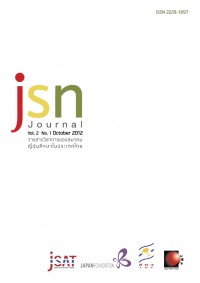อิทธิพลของระยะห่างทางจิตใจและภาพลักษณ์ของ ประเทศที่มีผลต่อการยอมรับผู้ดูแลสุขภาพผู้สูงอายุ ชาวไทยโดยผู้สูงอายุชาวญี่ปุ่น
Main Article Content
Abstract
Influence of Psychic Distance and Country Image over Japanese Elderly on Acceptance of Thai Caregivers
Patnaree Srisuphaolarn
Faculty of Commerce and Accountancy, Thammasat University
Nuttapol Assarut
Faculty of Commerce and Accountancy, Chulalongkorn University
This study aims to investigate the effect of psychic distance as well as country image upon the acceptance of Thai health workers in the Japanese market. The questionnaire survey was conducted with 408 Japanese elderly respondents aged 55-80 years old. This number includes 108 respondents who are long-staying in Thailand and 300 respondents who reside in Japan. By conducting factor analysis, the psychic distance and country image factors can be reorganized into two groups of factors. First is people oriented factor-working manner, human interaction, social manner, and economics distance. Second is country oriented factor-technological distance, education distance, and cultural distance. The analysis results after conducting Structural Equation Modeling techniques reveals that individual oriented factors have higher influences over the acceptance of Thai health workers than country oriented factors.
Article Details
ข้อความและข้อคิดเห็นต่างๆ ในบทความเป็นของผู้เขียนบทความนั้นๆ ไม่ใช่ความเห็นของกองบรรณาธิการหรือของวารสาร jsn Journal


